Mosquitos in the fish tank is a common problem for most aquarium owners. While they can be a good food source for fish, excess amounts of mosquitos can be a problem for you, especially when they turn into adults.
Therefore taking every possible step to get rid of mosquitoes in a fish tank is a wise decision you can make.
In this article, we will talk about how mosquitoes end up in your fish tank as well as how to get rid of them.
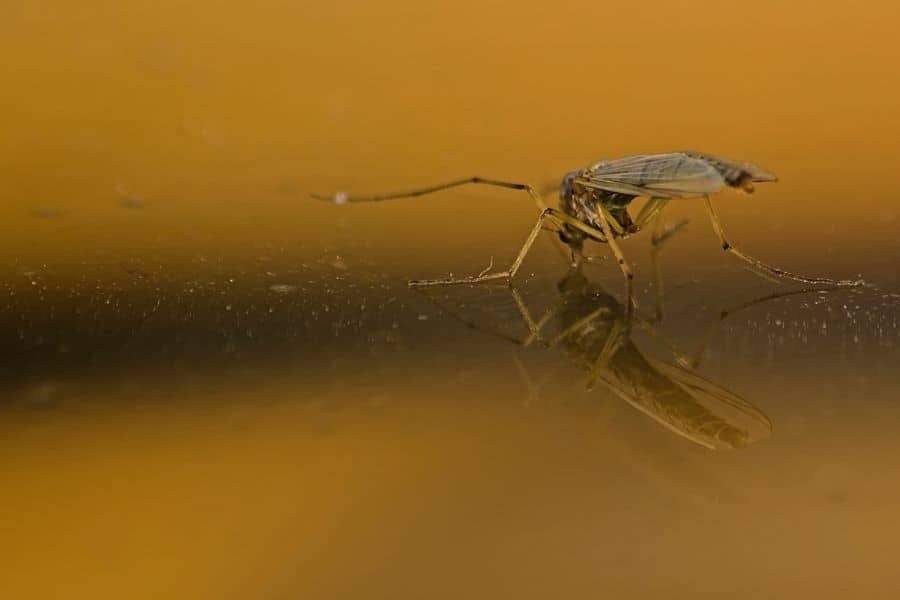
Mosquitos in the fish tank
Jump To
Mosquitoes end up in your tank when one or several mosquitoes lay eggs on the water’s surface.
Mosquitoes have four life stages in their life cycle; eggs, larvae, pupa, and adult stage.
In the adult stage, most female mosquitoes reproduce sexually by mating with a male mosquito.
And then, the female mosquito lays the fertilized eggs on the still bodies of water, mostly at night. One mosquito usually lays about 100 to 300 eggs at a time.
The second stage of mosquitoes begins when the eggs hatch within about 24 to 48 hours.
Mosquito larvae are free-swimming creatures that wriggle around still waters. They have a worm-like appearance and are known as wrigglers.
Mosquito larvae are not a cause for concern for the aquatic life of the fish tank. In fact, they are an excellent live protein source for your fish.
But they can be a problem to you once they become adults.
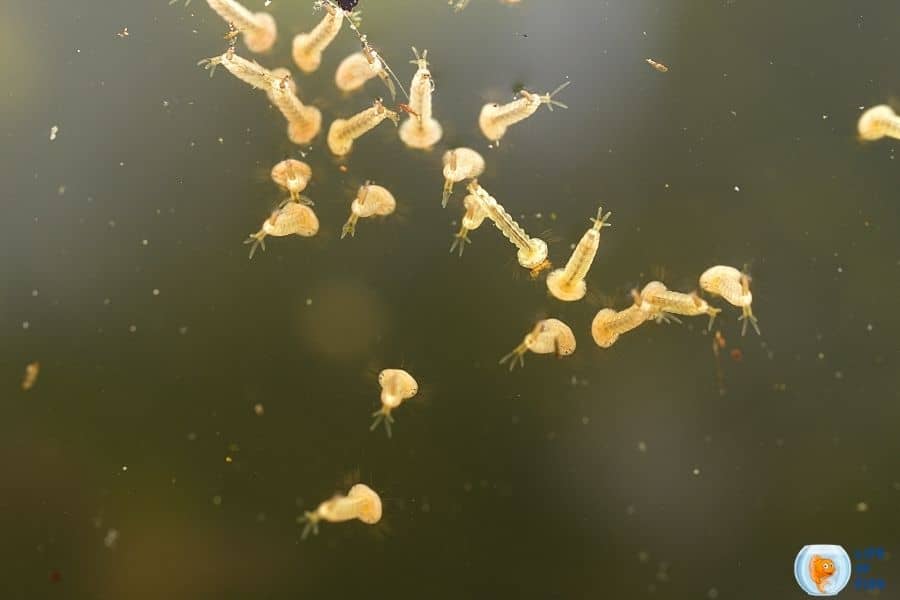
Mosquito eggs in the fish tank
Finding out mosquito eggs in the fish tank is quite difficult.
However, if you check with a microscopic device, you may be able to locate them—the eggs float on the water surface and look like a black powdery substance.
The egg itself is tiny, but all eggs’ set is about ¼ inch long and ⅛ inch wide.
If you have carnivore fish that feed on the surface of the water, they will get rid of the eggs in no time, leaving less hassle for you.
Mosquito larvae in the fish tank
Mosquito larvae are not a problem if you have plankton-eating fish as they finish consuming them before the larvae get to grow into adults.
They do not harm any aquarium life and feed on algae, fungi, plankton, and any small things that come into their mouth.
Mosquito larvae cannot breathe underwater. Therefore they reach the surface to take in oxygen via a breathing tube known as a siphon.
This is why they are most visible to the human eye because they primarily stay underneath the water’s surface.
Are mosquito larvae dangerous?
Mosquito larvae are not dangerous to fish or any other aquarium creature because they are so tiny and can only feed on micro-organisms in the water.
But, they can be dangerous to us after growing into adults because some mosquitoes carry some deadly diseases such as dengue, Zika, malaria, and Chikungunya.
Mosquito larvae life span in the water
Once mosquitoes lay eggs, the eggs hatch within 24 to 48 hours, and larvae come.
Mosquito larvae spend 4 to 14 days in the water, depending on the water temperature.
Furthermore, they lose their skin several times until it grows into a pupa, which evolves into a flying mosquito in 2-3 days. The life span of a flying mosquito is about seven days.
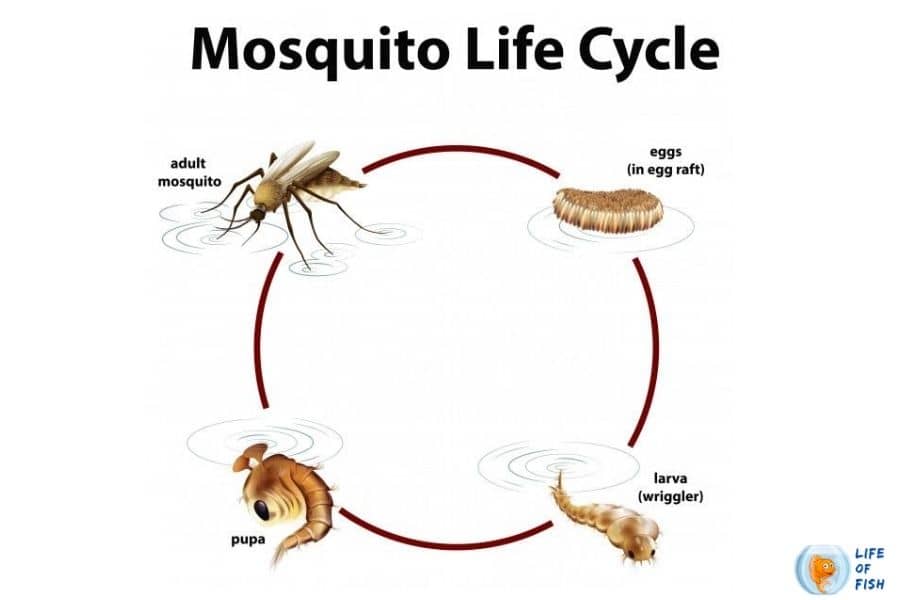
How do you kill mosquito larvae in a fish tank?
The easiest way to kill mosquito larvae in a fish tank is to use a Chemical Larvicide such as Pyriproxyfen and methoprene.
These larvicides work by preventing mosquito larvae from growing into adults and do not kill them right away.
Chemical Larvicides can be lethal to your aquarium life, so before using any product, do a thorough search to confirm if it is safe for your fish and other life in the aquarium.
It is better to hire a professional to do this job if you are unsure of what you are doing. And also, only use this method if you’ve got a massive mosquito larvae infestation.
How To Get Rid Of Mosquitoes In Fish Tank
Seeing mosquito larvae in your aquarium can be a nightmare. Fortunately, dealing with this pesky infestation is easier than you think.
By following one or more of the methods listed below, you can get rid of mosquitoes in your aquarium within a short period of time.
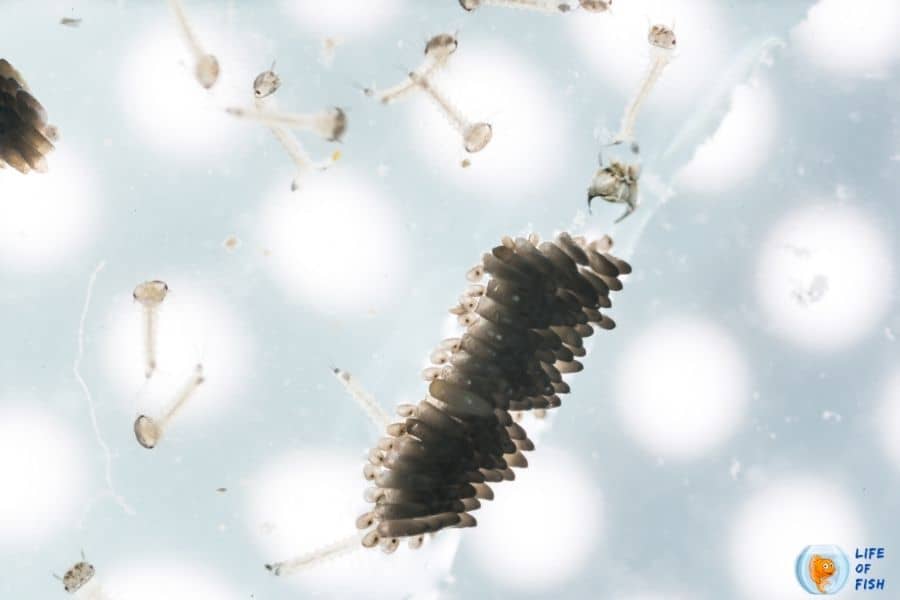
Cover the fish tank with a net
If the tank is open, there is a high potential for mosquito larvae growth in your tank since mosquitoes have full access to lay their eggs on the tank.
A simple but one of the most effective and foolproof solutions is to cover your tank with a net.
This will keep mosquitoes from depositing eggs in the water, so you’ll never have any mosquito larvae in your tank.
If you have already got some larvae by the time you cover the tank with a net, then you will have to go with another solution to kill the larvae along with this method.
When choosing a net for this purpose, you should be careful to choose a net with very small openings.
Make sure that mosquitoes can not pass through the holes of the net; otherwise, this method won’t work.
Covering the tank with a net has several other benefits. It prevents your fish from jumping out of the tank and also prevents leaves and other dirt from falling into the water.
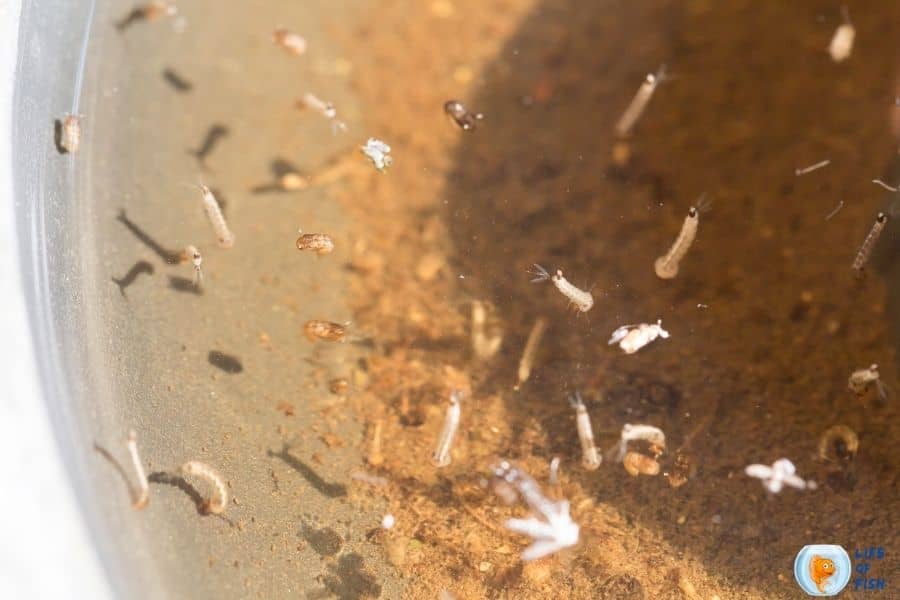
Keep a constant water current in the tank
Mosquitoes lay eggs only on the still waters. And also, larvae can not survive in moving water.
So, an excellent way to prevent mosquitoes from laying eggs in the tank is to keep water current in the tank.
When the water in the tank is constantly moving, mosquitoes avoid laying eggs in the tank.
A good way to keep constant water current is to use a water filter or a pump powerful enough for your tank.
Do not use a filter that is too powerful for your tank, as it may do more harm than good for both your fish and tank.
Reduce Vegetation
Usually, algae and other micro-organisms thrive in vegetated tanks, and larvae feed on these micro-organisms for nutrition.
When you cut off their food source, larvae don’t get to survive in the water for long.
The best way to cut off their food source is to reduce plants in your tank. Reducing plants is an effective method of getting rid of mosquitoes from your fish tank.
You can also transfer all the plants to another temporary tank until the mosquito larvae infestation goes away.
Frequently change the water
Performing frequent water changes solve many issues that arise in fish tanks, and this one is no exception.
You can stop mosquitoes from laying eggs in the tank by changing the water frequently. Changing water prevents water from being stagnant and keeps the freshness of water.
Mosquitoes generally visit and lay eggs on stagnant water. When the water is fresh and smells good, mosquitoes usually avoid visiting that place to lay eggs.
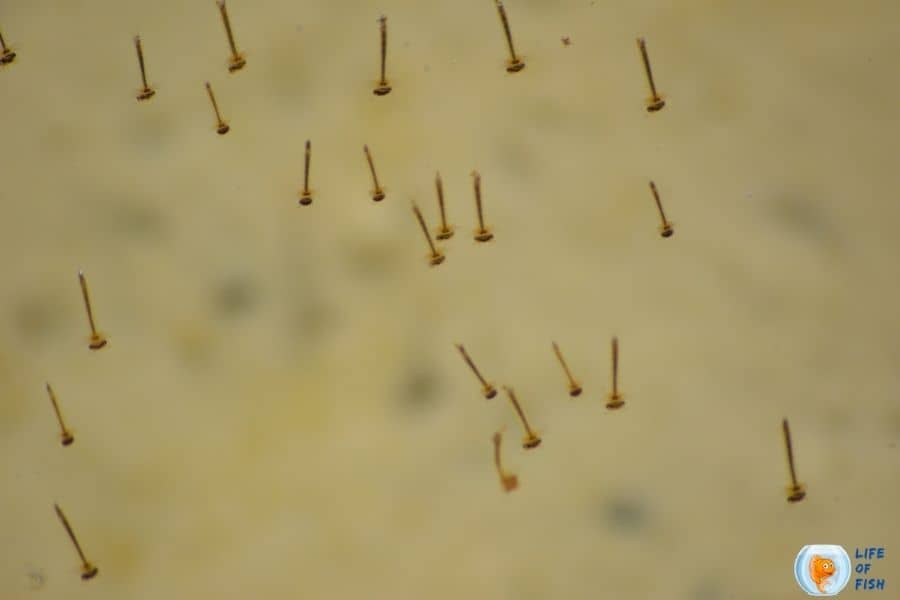
Add Larvae Eating fish
Many carnivores and omnivore fish graze on mosquito larvae, so adding larvae-eating fish is an excellent solution to get rid of mosquito larvae.
If you keep these fish in your tank, they will eat every single larva in your tank as long as they live in your tank.
But, keep in mind that some fish species may become pests themselves by over breeding in the tank.
One such species is mosquito fish. When they receive enough protein sources (which mosquito larvae are), they tend to reproduce offspring like crazy.
So, either you’ll have to give away the offspring or not keep them at all.
However, combining one of the other methods of preventing mosquitoes from laying eggs with larvae eating fish can be a surefire way of getting rid of mosquitoes in your aquarium.
For example, covering the tank with a net and larvae eating fish in the tank can prevent mosquitoes from laying eggs and kill already living larvae in the tank.
Treat the tank with chemical larvicides
If your tank has a massive mosquito larvae infestation and any of the above methods don’t work effectively, you may opt for this method.
Chemical larvicides prevent mosquito larvae from developing into adults. So, when their lifespan as larvae finishes, they die.
Some chemicals that work well in the fish tank are Pyriproxyfen and methoprene.
However, you should be careful when using these chemicals in fish tanks. For the safety of fish and other aquatic life, take the necessary steps before following this procedure.
If you don’t have experience using these chemicals before, hiring a professional to be extra safe is better.
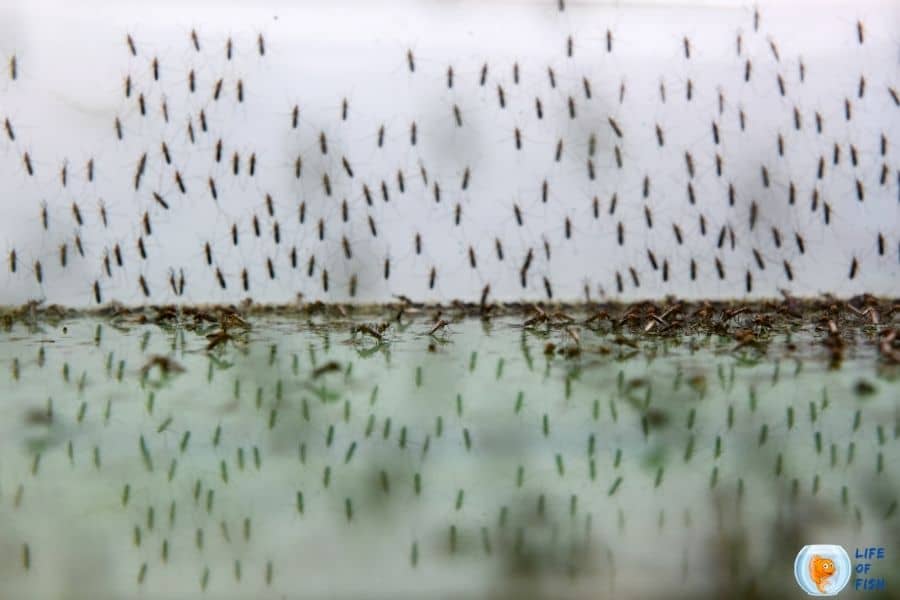
Do fish eat mosquito larvae?
Usually, most carnivore fish that feed on zooplanktons eat mosquito larvae. Because of these fish, mosquito larvae do not get the chance to form into adult mosquitoes.
So, the mosquito population will reduce if you keep mosquito larvae eating fish in your fish tank.
Below are some fish types that eat mosquito larvae.
- Mosquito fish
- Bluegills
- Goldfish
- Guppies
- Tilapia
- Koi Carp
- Tilapia
- Minnows
- Bass
- Catfish
When selecting larvae-eating fish, always check for their compatibility in the water parameters of your tank and fish.
For example, if you have a shrimp tank and breed, larvae-eating fish may not be a good option because they may also eat shrimp eggs and shrimplets.
On the other hand, tropical fish like guppies can not tolerate extreme cold. The best bets for fish tanks that reside in cold weather conditions will be goldfish and Koi carp.
Live-bearing fish like mosquito fish, guppies, and minnows are known to reproduce a lot.
So, when they get plenty of protein-rich food (larvae), they tend to reproduce at a higher rate.
So, keeping these fish may not be a good choice for mosquito larvae eating unless you have extra space or additional tanks.
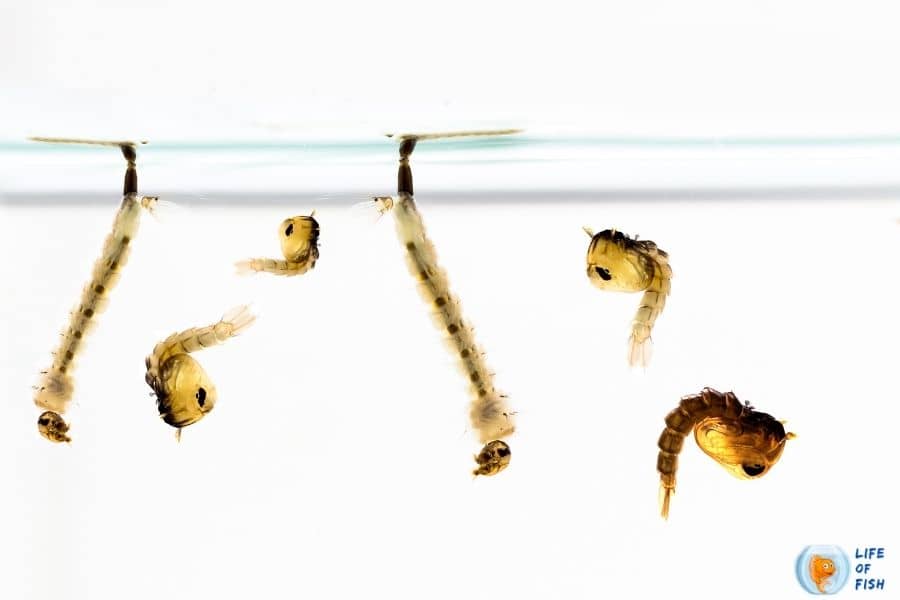
Related Questions
Will dish soap kill mosquito larvae?
Dish soap can actually kill mosquito larvae.
A tiny bit of soap or shampoo in water can kill mosquito larvae within about one day and will need only 1ml of soap for one gallon of water to make it work.
However, soap can kill your aquatic life as well. You should never use soaps or detergents of any kind for your fish tank as they are harmful to your fish.
Will vinegar kill mosquitoes?
Vinegar is one of the best natural liquids that can repel mosquitoes and many other pests. You can use vinegar as a pest control spray at home.
However, it is not recommended to use vinegar in a fish tank because vinegar can change the water chemistry by adjusting pH levels.
Changes in pH can affect your fish badly. Therefore, we do not use vinegar to get rid of mosquitoes in fish tanks.
Will Baking Soda Kill Mosquito Larvae?
Baking soda killing mosquito larvae is actually a myth.
You should not use baking soda in your aquarium because not only does it not kill mosquito larvae, but also it raises the pH level of water.
Increased pH levels can make fish susceptible to diseases; therefore, it is recommended not to use baking soda in fish tanks at all costs.
What smell do mosquitoes hate?
Mosquitoes hate various natural scents. Some of the scents are,
- Citronella
- Clove
- Orange
- Cedarwood
- Lavender
- Eucalyptus
- Garlic
- Peppermint
- Lemon
- Rosemary
- Basil
- Catnip
- Lemongrass
- Geraniol
- Lantana
So, if you have any of these ingredients at home, you can use them to repel mosquitoes, at least for few minutes. But, pouring them into the fish tank is not recommended.
Conclusion
Mosquitoes lay their eggs on the surface of stagnant, still waters.
Preventing these ideal conditions for the mosquitoes to lay eggs in the fish tank can naturally help you get rid of mosquitoes in your fish tank.
Alternatively, you can cover the tank with a net, introduce larvae-eating fish and use chemical larvicides to control mosquito larvae in your fish tank.
Mosquitoes do not harm any of your aquatic life, but they can harm humans by spreading deadly diseases.
Thus, you should take every possible step to prevent mosquito growth in your tank.
Read Next: Accidentally Poured Too Much Fish Food: What Should You Do?
